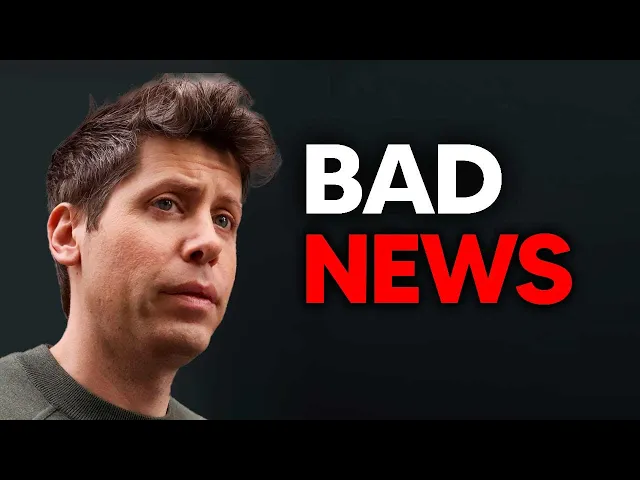OpenAI Just Hit a MASSIVE Roadblock …

OpenAI's big mission shift risks future
The nonprofit-turned-tech-giant OpenAI is facing unprecedented internal resistance as it attempts to restructure into a for-profit entity. An open letter titled "Not For Private Gain," signed by dozens of former OpenAI employees including prominent AI researchers, has emerged as a serious legal and ethical challenge to the company that created ChatGPT. The signatories are urging attorneys general in California and Delaware to block what they see as a fundamental betrayal of OpenAI's founding principles.
Key Points
-
Foundational betrayal: OpenAI was explicitly created to ensure AGI benefits humanity "unconstrained by a need to generate financial return" – the proposed restructuring directly contradicts this mission by prioritizing financial obligations over societal benefit.
-
Astronomical wealth transfer: AGI is projected to generate "unprecedented economic benefits" – potentially "the light cone of all future value." The letter argues this restructuring would redirect this wealth from humanity at large to a small group of private shareholders.
-
Loss of public accountability: Converting from a nonprofit to a Public Benefit Corporation would remove crucial legal oversight by public officials and transfer enforcement power primarily to shareholders motivated by financial returns.
The Stakes Couldn't Be Higher
The most critical insight from this conflict is that we're witnessing the real-time privatization of what could be the most transformative technology in human history. OpenAI's own leadership, including CEO Sam Altman, has repeatedly acknowledged that AGI will bring "serious risks of misuse, drastic accidents, and societal disruption." Altman himself signed a statement saying mitigating extinction risk from AI should be a "global priority" alongside pandemics and nuclear war.
This isn't simply corporate restructuring – it's a fundamental question about who will control and benefit from technology that could reshape civilization. The original cap-profit structure was specifically designed as a safeguard to prevent concentration of this unprecedented power. By dismantling these guardrails less than two years after Altman testified to Congress about their importance, OpenAI is signaling that investor demands now outweigh the safety commitments that defined its creation.
Looking Beyond the Letter
What's particularly striking is how this situation mirrors similar ethical transitions throughout tech history. Facebook's evolution from "connecting people" to a
Recent Videos
How To Earn MONEY With Images (No Bullsh*t)
Smart earnings from your image collection In today's digital economy, passive income streams have become increasingly accessible to creators with various skill sets. A recent YouTube video cuts through the hype to explore legitimate ways photographers, designers, and even casual smartphone users can monetize their image collections. The strategies outlined don't rely on unrealistic promises or complicated schemes—instead, they focus on established marketplaces with proven revenue potential for image creators. Key Points Stock photography platforms like Shutterstock, Adobe Stock, and Getty Images remain viable income sources when you understand their specific requirements and optimize your submissions accordingly. Specialized marketplaces focusing...
Oct 3, 2025New SHAPE SHIFTING AI Robot Is Freaking People Out
Liquid robots will change everything In the quiet labs of Carnegie Mellon University, scientists have created something that feels plucked from science fiction—a magnetic slime robot that can transform between liquid and solid states, slipping through tight spaces before reassembling on the other side. This technology, showcased in a recent YouTube video, represents a significant leap beyond traditional robotics into a realm where machines mimic not just animal movements, but their fundamental physical properties. While the internet might be buzzing with dystopian concerns about "shape-shifting terminators," the reality offers far more promising applications that could revolutionize medicine, rescue operations, and...
Oct 3, 2025How To Do Homeless AI Tiktok Trend (Tiktok Homeless AI Tutorial)
AI homeless trend raises ethical concerns In an era where social media trends evolve faster than we can comprehend them, TikTok's "homeless AI" trend has sparked both creative engagement and serious ethical questions. The trend, which involves using AI to transform ordinary photos into images depicting homelessness, has rapidly gained traction across the platform, with creators eagerly jumping on board to showcase their digital transformations. While the technical process is relatively straightforward, the implications of digitally "becoming homeless" for entertainment deserve careful consideration. The video tutorial provides a step-by-step guide on creating these AI-generated images, explaining how users can transform...
